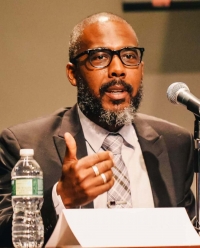
Dr. Samuel Kelton Roberts, Jr., is Associate Professor of History (School of Arts & Sciences) and Associate Professor of Sociomedical Sciences (Mailman School of Public Health). He writes, teaches, and lectures widely on African-American history, medical and public health history, urban history, issues of policing and criminal justice, and the history of social movements. His book, Infectious Fear: Politics, Disease, and the Health Effects of Segregation (UNC Press, 2009), demonstrates the historical and continuing links between legal and de facto segregation and poor health outcomes. He sits on several boards for organizations working for social justice, health improvement, and arts and activism. In 2013-14, Dr. Roberts served as the Policy Director of Columbia University’s Justice Initiative, where he coordinated the efforts of several partners to bring attention to the issue of aging and the growing incarcerated elderly population. This work led to the publication of the widely-read landmark report, Aging in Prison Reducing Elder Incarceration and Promoting Public Safety (New York: Columbia University Center for Justice. November 2015. http://centerforjustice.columbia.edu/policy/aging-in-prison/).
Dr. Roberts, a 2017 recipient of the Lenfest Distinguished Faculty Award, and several times nominated for the Van Doren Teaching Award (not yet a winner!), brings innovative approaches to teaching through collaborative group partnerships with community organizations in which students may apply what they have learned in the classroom to the world beyond the gates. These classroom experiences include investigations of human rights and living conditions in New York’s arraignment court holding pens, public policy research informing campaigns for public health improvements in New York State prisons, and oral histories of substance abuse and addiction treatment.
As the Faculty in Residence for Columbia’s West Campus, Dr. Roberts brings fresh and community-building programming to campus. Many of his FIR events feature on and off-campus opportunities for West Campus residents to engage successful professionals working in a wide range of occupations.

